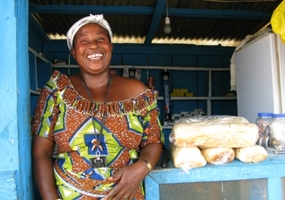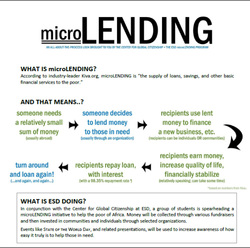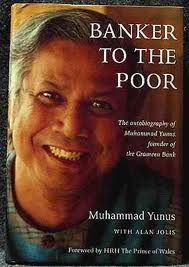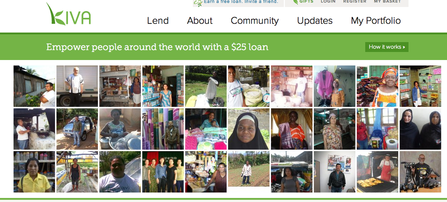
Rather than buy my book, I’m encouraging you to do something different with that $20 – fund a microloan to an impoverished person. I know, I know, you gave at the office, you donate to charity at your church, or you’re overwhelmed with infomercials soliciting donations for people in far away places but this is NOT a donation.
Listen closely, because what I’m about to share is considered one of the most effective ways to bring people out of desperate poverty all over the world, giving them and their children a fighting chance for a decent life.

If they don’t pay it back they don’t get another loan, as simple as that. However, most microloan programs, like Grameen Bank, report that repayment rates are between 95-98%. Once the lender (you) is repaid, you can chose to work with the same recipient again, fund another person’s loan, or just pocket your original investment.
The problem with poverty in most countries is that there's no tangible lifeline to pull themselves out of it, like education, entrepreneurship, and old-fashioned hard work here in the U.S. Instead, their desperate crawl upward is further slickened by racial, tribal, and especially gender taboos. Basically, when women are born into poverty, they will always be poor, and their families will be poor, as will their children, and their children’s children. The horrific gender-imbalance of poverty is well detailed in the book Half The Sky, which I highly recommend – if you can stomach it.
But microloans, or microcredit, as it’s sometimes called, can give them a fighting chance to grasp otherwise-impossible financial momentum. Originally traced to several organizations to help the poor in Bangladesh in the 1980’s, Muhammed Yunus is considered the father of the movement, as documented in his book Banker to the Poor, and won the Nobel Peace Prize in 2006 for his work. As of 2009, an estimated 74 million men and women held microloans that totaled US$38 billion, all over the world.

The potential loan applicants apply through organizations like Kiva or ProMujer, where you can see their picture, read about their lives, and find out their business plan once they receive the money. They post a certain target goal for their loan, say $500, and micro-lenders pledge money toward that goal until the amount is reached, when the money is delivered. The repayments are carefully tracked and posted on the applicant’s profile on the website, so their credibility with repayment is of utmost concern so they won't jeopardize future loans.
Microloans endeavor to augment what international organizations like the United Nations and billions of dollars in foreign aid attempt – to empower people to work their way out of poverty with permanent changes that end the cycle of poverty. By making a microloan you are, essentially, not giving them a fish, but teaching them how to fish and supplying them with a rod. Of course, microloans are by no means a panacea to the world’s poverty, and critics cite high transaction costs and interest rates, problems with disseminating these programs out of urban centers to remote rural areas, and the educational foundation needed to grasp these concepts and apply, as holes in the fabric of microloans. It’s been found that microloan programs work best alongside educational initiatives, women’s discussion groups, and support networks that hold each other accountable to timely repayments. This community enforcement model goes a long way to patching those holes.

So please don’t buy my book, or skip your daily Starbucks this this week, and instead pledge that money to funding a microloan. That $20 can kick start a venture for one of your brothers or sisters in the world, allowing them to feed their families, keep a roof over their heads, access medical care, educate their daughters, and bring their children’s children out of poverty.
From the bottom of my heart, thank you.
Norm :-)
PS If you'd like to read a few more of my thoughts about the nature of philanthropy and giving, check out this past article.
Tamarindo, Costa Rica, surf, ski, snowboard, diving, pura vida, Central America, Nicaragua, San Juan del Sur, Amazon best seller, travel, adventure, backpack, hiking, sharks, Endless Summer, Robert August, memoir, fitness journey, globetrotting, perfect beach, paradise, spring break, expat, live abroad, work abroad, summer reading, around the world, great read, humor, laugh out loud
 RSS Feed
RSS Feed